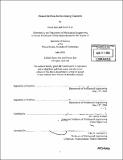Peanut oil press for developing countries
Author(s)
Jain, Neera, S.B. Massachusetts Institute of Technology; Lee, Somin
DownloadFull printable version (8.446Mb)
Other Contributors
Massachusetts Institute of Technology. Dept. of Mechanical Engineering.
Advisor
David Wallace.
Terms of use
Metadata
Show full item recordAbstract
Despite the problems with obesity that the United States is facing today, malnutrition, caused in part by severely low dietary fat consumption, remains a problem among many people living in Sub-Saharan Africa. According to the World Health Organization, one third of people in developing countries are malnourished as well as vitamin or mineral deficient. While villagers do not have access to commercially produced vegetable oil (a common source of dietary fat), nor are industrial scale oil extraction methods appropriate for small scale production. As a result, they turn to traditional methods, such as a mortar and pestle, to extract oil from peanuts, sunflower seeds, and other oil bearing seeds and nuts. This process is both time and labor intensive, and still does not yield sufficient amounts of oil to satisfy the need for it. The need for a small scale press is clear. This thesis introduces a simple design which achieves a yield of 46.9 mL per cup (U.S.) which matches the yield produced using industrial technologies. This corresponds to 153% increase in yield and 38.5% increase in rate over using traditional methods such as a mortar and pestle. The design consists of two fixed plates connected by four rods, with a third plate which slides along the four guide rods. (cont.) A standard scissor jack is the mechanism by which the necessary pressure of 800-1000 psi is generated to extract the oil. A peanut container with a removable bottom holds the peanuts as they are pressed, and holes drilled into its cylindrical face allow the oil to spill out into a collection dish underneath the container. The entire design is compact, with a footprint of one square foot and a height of 22 inches. This is 12 times smaller than the Beilenberg ram press, the standard for small scale presses currently used in developing countries. Experimental results of the loading profile as function of time show that the jack does not need to be turned continuously once the oil begins to appear. This requires significantly less strength than current methods of oil extraction. Although future work is recommended to further develop and improve the press, it shows promise of alleviating the need for such a device in many impoverished parts of the world.
Description
Thesis (S.B.)--Massachusetts Institute of Technology, Dept. of Mechanical Engineering, 2006. Includes bibliographical references (leaves 34-35).
Date issued
2006Department
Massachusetts Institute of Technology. Department of Mechanical EngineeringPublisher
Massachusetts Institute of Technology
Keywords
Mechanical Engineering.